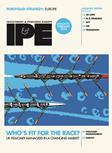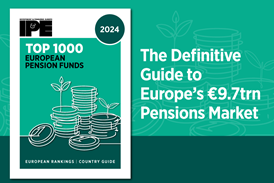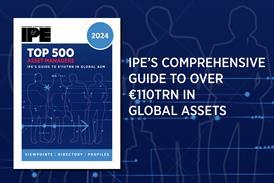Investment – Page 7
-
 Interviews
InterviewsLCH: The other side of the mirror
Isabelle Girolami undoubtedly has a strong background in financial services, having worked for a range of very different institutions in very different roles. She was COO at the fixed income division of BNP Paribas, before going on to a similar role at Bear Stearns, the bank that failed early in 2008 and which was subsumed into JP Morgan. Prior to her current role at LCH she was global head of markets at Crédit Agricole.
-
 Features
FeaturesQontigo Riskwatch – May 2023
*Data as of 31 March 2023. Forecast risk estimate for each index measured by the respective US, World and Emerging Markets Qontigo model variants
-

-
 Features
FeaturesAhead of the curve: What happened to equity volatility in 2022 and what next?
Something strange happened last year. Expectations about the future level of volatility in US equities – implied volatility – behaved in a very unusual way. In a falling market, the price of implied volatility normally rises because equity falls are associated with a worsening macroeconomic outlook, implying more market risk. Expectations of future volatility therefore increase.
-
 Features
FeaturesJapan: New hand on the tiller
Kazuo Ueda, is the first new governor of the Bank of Japan (BoJ) in 10 years. One of outgoing governor Haruhiko Kuroda’s last moves was to widen the yield curve control (YCC) band on 10-year bonds from +/-25bps to +/-50bps. The reaction from the bond market over the following few days was to trade to the new upper limit.
-
 Features
FeaturesIPE Quest Expectations Indicator May 2023
Russian air superiority over Ukraine is coming to an end due to lack of equipment. Destroying civilian targets is counterproductive and consumes ammunition. Bakhmut is eating into Russian resources, while Ukraine is being re-armed. History teaches that better technology, rather than numerical superiority, wins wars. But even a lopsided Ukrainian win would not automatically mean peace.
-
 Features
FeaturesEmerging markets decarbonisation
The International Energy Agency estimates that developing economies and emerging markets are responsible for more than two-thirds of global carbon emissions.
-
 Features
FeaturesAhead of the curve: Introducing the concept of a carbon risk-free curve
As global investors and companies progress towards their net-zero emissions targets, the concept of a carbon risk-free curve becomes increasingly relevant within the fixed-income market. In our view, this curve should provide a reference for evaluating the risk levels of bonds in relation to their issuers’ CO₂-equivalent (CO₂e) emissions and can therefore help investors to assess the impact of changes in CO₂e emissions on the yield spread of fixed-income bonds.
-
 Interviews
InterviewsNikko Asset Management: Complex, creative thinking
Stefanie Drews is at home with complexity. She speaks several languages fluently, including Japanese, and tells us she still does her maths in Italian.
-
 Features
FeaturesQontigo Riskwatch – April 2023
*Data as of 28 February 2023. Forecast risk estimate for each index measured by the respective US, World and Emerging Markets Qontigo model variants
-

-
 Features
FeaturesIPE Quest Expectations Indicator April 2023
With new, superior equipment, the Ukrainian military is set to start an offensive soon. Meanwhile, Yevgeny Prigozhin, leader of the Wagner Group, is jockeying to become Russia’s next kleptocrat on the back of the Russian army. Donald Trump’s candidacy is increasingly beleaguered by defeats in court. The trade agreement on Northern Ireland between the EU and the UK is a significant boon for both as well as for Prime Minister Rishi Sunak, not because the trade flows are so important but because the issue blocked co-operation in many other fields. While the winter has been mild and beneficial, there are early signs of a dry spring, quite possible in view of climate change setting in. If that materialises, harvests, therefore food prices, will be affected in autumn.
-
 Features
FeaturesFear and loathing in European banks
Any CEO would recognise there is a problem when investors do not want to put their money to work with you. That is the situation that European banks find themselves in. The MSCI Europe bank index has considerably underperformed its MSCI Europe parent over the last 10 years.
-
 Features
FeaturesPrivate equity fundamentals resilient in headwinds
The economy and markets are beset with headwinds, and private equity assets are unlikely to be impervious. The concerns with the asset class are wide-ranging, from difficult financing conditions to rising interest rates, squeezed corporate margins and closed exit routes.
-
 Interviews
InterviewsBain Capital: Vintage private equity
“In our world, it is quite easy to describe what we do, but it is very hard to do it,” says Robin Marshall, partner at Bain Capital. That statement encapsulates the concept of private equity and is also an effective introduction to his firm. Private equity may be a straightforward idea, but in reality it is an incredibly complex undertaking, which is why the asset class remains a non-core allocation within institutional portfolios.
-
 Features
FeaturesAhead of the curve: The missing elements in the digital currencies debate
The recent contraction of the cryptocurrency markets poses questions about the viability of digital currency as an asset class for institutional investors. However, these developments have not undermined the efforts of central banks to pursue their own digital currency initiatives.
-
 Features
FeaturesQontigo Riskwatch – March 2023
*Data as of 31 January 2023. Forecast risk estimate for each index measured by the respective US, World and Emerging Markets Qontigo model variants
-

-
 Features
FeaturesIPE Quest Expectations Indicator March 2023
The next Ukrainian offensive will be in April at the earliest, as modern tanks will have arrived by then. US Republican pushback of ESG and climate-related investments are a new bone of contention in relations with the EU, already strained by the Trump presidency, and a bad sign for US-EU co-operation on China policy, an issue Japan seems to be ducking successfully. Aided by a soft winter, EU energy concerns have become quite manageable.
-
 Features
FeaturesHigh yield bonds: do your homework
Last year, European bond markets were struck by a toxic a combination of geopolitical, economic and market tensions. The picture has improved with the dawning of 2023, although the markets will continue to experience bouts of volatility and uncertainty will persist. High yield is back on the agenda, but selectivity and careful analysis will be key in identifying the right opportunities.





